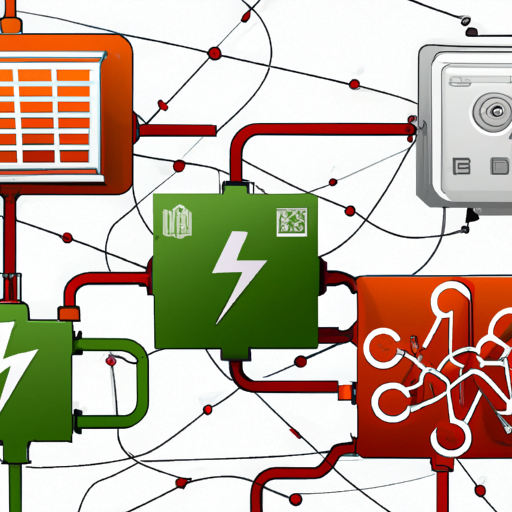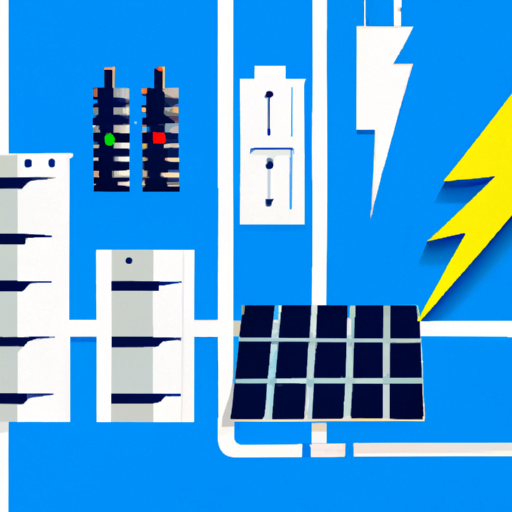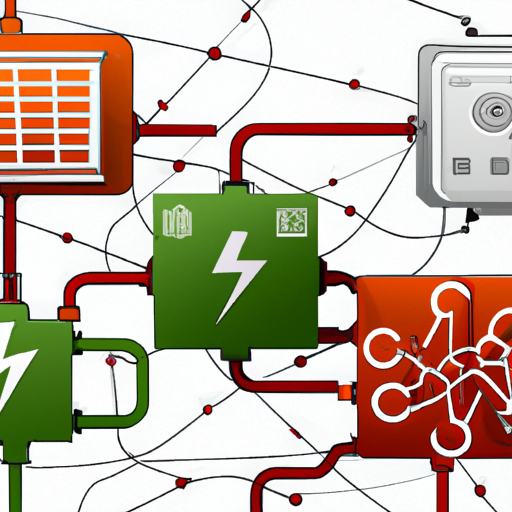So, have you ever wondered which is better – living on-grid, off-grid, or with a hybrid system? It’s a pretty interesting topic, isn’t it? Well, let me tell you, there are definite pros and cons to each option.
Living on-grid means you’re connected to the traditional power grid. This means you have a constant and reliable source of electricity, which is definitely convenient. You don’t have to worry about power outages or changing weather conditions affecting your energy supply. However, you are completely reliant on the grid, and your electricity bill will reflect that.
On the other hand, living off-grid means you’re completely self-sufficient when it comes to generating power. You rely on renewable energy sources such as solar panels, wind turbines, or hydroelectric systems. This means you have more control over your energy and it can be a great way to reduce your carbon footprint. However, it can also be more expensive upfront to set up and maintain these systems, and you may have to make lifestyle adjustments to accommodate for the limits of your power generation.
And then there’s the hybrid system, which combines the best of both worlds. It allows you to generate your own power through renewable energy sources, but you still remain connected to the grid as a backup. This gives you the flexibility to use renewable energy when it’s available, but also ensures that you have a reliable power source if your renewable systems cannot meet your energy demands. It’s a great compromise if you want the benefits of both on-grid and off-grid living.
Interested to learn more about the intricacies and differences between these systems? Well, you’re in luck because the rest of the article will delve deeper into each option, discussing their advantages, disadvantages, and everything else you need to know to make an informed decision.

Introduction
When it comes to meeting our energy needs, we have various options available to us. The most common systems, which are on-grid, off-grid, and hybrid systems, each have their own advantages and limitations. In this article, we will explore these different energy systems and compare them in terms of energy independence, reliability, environmental impact, suitability for different regions, and cost-effectiveness. By the end of this article, you will have a better understanding of which system may be the best fit for your individual needs.
Living off grid
Living off-grid refers to living without dependence on public utilities, especially the electrical grid. Many people choose this lifestyle for its benefits and the opportunity to live more sustainably.
Benefits of living off grid
One of the primary benefits of living off-grid is energy independence. With an off-grid system, you are not reliant on the power grid and are not at the mercy of power outages or fluctuating electricity prices. This can provide a sense of peace and security, knowing that you have control over your energy supply.
Living off grid also allows for a more sustainable lifestyle. By generating your own electricity through renewable sources such as solar panels or wind turbines, you are reducing your carbon footprint and decreasing your reliance on non-renewable energy sources. This can have a positive impact on the environment and contribute to a more sustainable future.
Challenges of living off grid
While living off-grid offers numerous benefits, it also comes with its own set of challenges. One of the main challenges is the upfront cost of setting up the off-grid system. The initial investment can be significant, as you will need to purchase and install the necessary equipment, such as solar panels, batteries, and inverters. However, it’s important to consider the long-term savings and benefits that come with generating your own electricity.
Another challenge of living off-grid is the need to carefully manage your energy usage. With a limited energy supply, you will have to be conscious of how much electricity you are using and make adjustments to ensure you have enough power to meet your needs. This may require more efficient appliances and lifestyle changes to reduce energy consumption.
Sustainable practices in off-grid living
Living off-grid often goes hand in hand with adopting sustainable practices. In addition to generating your own electricity through renewable sources, there are other sustainable practices you can incorporate into your off-grid lifestyle. These may include rainwater harvesting, composting toilets, organic gardening, and minimizing waste. By embracing these practices, you can further reduce your environmental impact and live more harmoniously with nature.

On-Grid Systems
On-grid systems, also known as grid-tied systems, are connected to the electrical grid and rely on it for electricity supply. This is the most common energy system in urban areas.
Definition and components
An on-grid system consists of solar panels or other renewable energy sources that generate electricity. This electricity is then fed into the grid and can be used by other consumers. The system may also include an inverter, which converts the direct current (DC) generated by the solar panels into alternating current (AC) that can be used for household appliances.
Advantages of on-grid systems
One of the main advantages of on-grid systems is the ability to sell excess electricity back to the grid. If your system generates more electricity than you consume, you can feed the surplus energy into the grid and receive credits or payments from the utility company. This can help offset your electricity costs and even result in a profit.
On-grid systems also provide a high level of reliability. Since you are connected to the grid, you have access to a consistent electricity supply. This means you do not have to worry about running out of power or dealing with the maintenance and replacement of batteries, as is the case with off-grid systems.
Limitations of on-grid systems
One limitation of on-grid systems is their dependence on the grid. If there is a power outage or grid failure, you will also be without electricity, even if your system is capable of generating power. This can be a major inconvenience, especially during extreme weather events or natural disasters.
Another limitation is the lack of energy independence. With an on-grid system, you are still reliant on the availability and price of grid electricity. This means your electricity costs can fluctuate, and you may not have complete control over your energy supply.
Cost considerations
The cost of an on-grid system can vary depending on factors such as the size of the system, the cost of solar panels, and the cost of installation. In general, an on-grid system tends to be less expensive upfront compared to off-grid systems, as you do not need to invest in batteries or other storage options. The return on investment can also be faster, especially if you are able to sell excess electricity back to the grid.
Off-Grid Systems
Off-grid systems, also known as standalone systems, are not connected to the electrical grid and rely on battery storage to store excess electricity for later use. This type of system is commonly used in remote areas or locations where connecting to the grid is not feasible.
Definition and components
An off-grid system consists of solar panels or other renewable energy sources, a charge controller to regulate the charging of batteries, batteries to store excess electricity, and an inverter to convert DC electricity stored in the batteries to AC electricity that can be used for household appliances.
Advantages of off-grid systems
One of the main advantages of off-grid systems is the ability to have complete energy independence. Since you generate and store your own electricity, you are not reliant on the grid and do not have to worry about power outages or fluctuating electricity prices. This can provide a sense of security and peace of mind, knowing that you have control over your energy supply.
Off-grid systems also offer the opportunity to live more sustainably. By generating electricity from renewable sources and storing excess energy in batteries, you are reducing your reliance on non-renewable energy sources and minimizing your carbon footprint. This can contribute to a more sustainable future and help protect the environment.
Limitations of off-grid systems
One limitation of off-grid systems is the upfront cost of setting up the system. The initial investment can be significant, as you will need to purchase and install the necessary equipment, including solar panels, batteries, and inverters. However, it’s important to consider the long-term savings and benefits gained from being able to generate your own electricity.
Another limitation is the need to carefully manage your energy usage. With a limited energy supply, you will have to be conscious of how much electricity you are using and make adjustments to ensure you have enough power to meet your needs. This may require more efficient appliances and lifestyle changes to reduce energy consumption.
Cost considerations
The cost of an off-grid system can vary depending on factors such as the size of the system, the cost of solar panels, batteries, and inverters, and the cost of installation. Generally, off-grid systems tend to have a higher upfront cost compared to on-grid systems due to the need for batteries and other storage options. However, over time, the savings from not having to pay for grid electricity can offset the initial investment.
Hybrid Systems
Hybrid systems combine elements of both on-grid and off-grid systems. They are connected to the grid but also have battery storage to store excess electricity for later use. This type of system offers the benefits of both on-grid and off-grid systems.
Definition and components
A hybrid system consists of solar panels or other renewable energy sources, a charge controller to regulate the charging of batteries, batteries to store excess electricity, an inverter to convert DC electricity stored in the batteries to AC electricity, and a grid interface that allows the system to be connected to the grid.
Advantages of hybrid systems
One of the main advantages of hybrid systems is the ability to have energy independence while still being connected to the grid. This means you can generate and store your own electricity, reducing your reliance on the grid and minimizing your carbon footprint. At the same time, you have the option to use grid electricity when needed, such as during periods of high energy demand or when your system is not generating enough electricity.
Hybrid systems also offer a high level of reliability. Since they are connected to the grid and have battery storage, you have access to a consistent electricity supply even during power outages or grid failures.
Limitations of hybrid systems
One limitation of hybrid systems is their higher upfront cost compared to on-grid systems. The additional components, such as batteries and inverters, increase the initial investment required. However, the long-term savings and benefits gained from energy independence and the ability to use grid electricity when needed can offset the higher upfront cost.
Another limitation is the need to carefully manage your energy usage. While hybrid systems provide more flexibility compared to off-grid systems, you still need to consider the capacity of your battery storage and make adjustments to ensure you have enough power to meet your needs.
Cost considerations
The cost of a hybrid system can vary depending on factors such as the size of the system, the cost of solar panels, batteries, inverters, and other components, and the cost of installation. Hybrid systems tend to have a higher upfront cost compared to on-grid systems, but the ability to use grid electricity when needed can result in long-term savings.
Comparison of On-Grid, Off-Grid, and Hybrid Systems
Now that we have explored the details of on-grid, off-grid, and hybrid systems, let’s compare them in terms of energy independence, reliability and grid dependency, environmental impact, suitability for different regions, and cost-effectiveness.
Energy independence
Off-grid systems offer the highest level of energy independence since they generate and store their own electricity. With an off-grid system, you are not reliant on the grid and have complete control over your energy supply. On the other hand, on-grid systems are fully reliant on the grid for electricity supply, while hybrid systems offer a balance between energy independence and grid connectivity.
Reliability and grid dependency
On-grid systems provide a high level of reliability since they are connected to the grid and have access to a consistent electricity supply. Off-grid systems, being independent of the grid, are not affected by power outages or grid failures. Hybrid systems offer the reliability of on-grid systems while also having battery storage as a backup during power outages or when the grid supply is insufficient.
Environmental impact
In terms of environmental impact, off-grid systems are the most sustainable option. By generating electricity from renewable sources and reducing reliance on non-renewable energy sources, you can minimize your carbon footprint and contribute to a more sustainable future. On-grid systems can also be environmentally friendly if they use renewable energy sources, but they still rely on the grid, which may include non-renewable energy sources. Hybrid systems offer the flexibility to use renewable energy sources and grid electricity, depending on the situation.
Suitability for different regions
Off-grid systems are most suitable for remote areas or locations where connecting to the grid is not feasible. These systems provide a self-sufficient option for those living in areas with limited access to grid electricity. On the other hand, on-grid systems are commonly used in urban areas where the grid is readily accessible. Hybrid systems can be suitable for a range of regions, providing both energy independence and grid connectivity.
Cost-effectiveness
Cost-effectiveness depends on various factors, including the initial investment, long-term savings, and potential income from selling excess electricity back to the grid. On-grid systems tend to have a lower upfront cost compared to off-grid systems, but the cost of grid electricity can fluctuate. Off-grid systems have a higher upfront cost due to the need for storage options, but you are not reliant on grid electricity, resulting in long-term savings. Hybrid systems have a higher upfront cost compared to on-grid systems but provide the flexibility to use grid electricity, potentially resulting in long-term cost savings.
Which is better: On-Grid, Off-Grid, or Hybrid?
Determining which system is better depends on individual needs and preferences. Here are some factors to consider when making a decision:
Factors to consider
- Energy independence: How important is it to you to have control over your energy supply and not be reliant on the grid?
- Reliability: Do you live in an area prone to power outages or grid failures? How important is it to have a consistent electricity supply?
- Environmental impact: Are you committed to reducing your carbon footprint and living more sustainably?
- Location: Do you live in a remote area where connecting to the grid is challenging? Or are you in an urban area where the grid is readily accessible?
- Cost: What is your budget for the initial investment, and what are your long-term savings goals?
Determining individual needs
To determine which system is the best fit for your individual needs, evaluate your priorities and requirements. Consider factors such as your energy consumption, location, budget, and environmental goals. It may also be helpful to consult with experts or professionals who can assess your specific situation and provide tailored recommendations.
Pros and cons of each system
Here’s a summary of the pros and cons of each system:
- On-grid systems offer reliability and lower upfront costs but lack energy independence and may rely on non-renewable energy sources.
- Off-grid systems provide energy independence and sustainability but require higher upfront costs and careful management of energy usage.
- Hybrid systems offer a balance between energy independence and grid connectivity but have higher upfront costs and still require energy management.
Conclusion
In conclusion, comparing on-grid, off-grid, and hybrid systems requires careful consideration of factors such as energy independence, reliability, environmental impact, suitability for different regions, and cost-effectiveness. Each system has its own advantages and limitations, and the best system for you depends on your individual needs and priorities. By understanding the features and benefits of each system, you can make an informed decision and choose the system that aligns with your goals for energy independence, reliability, sustainability, and cost-effectiveness.




